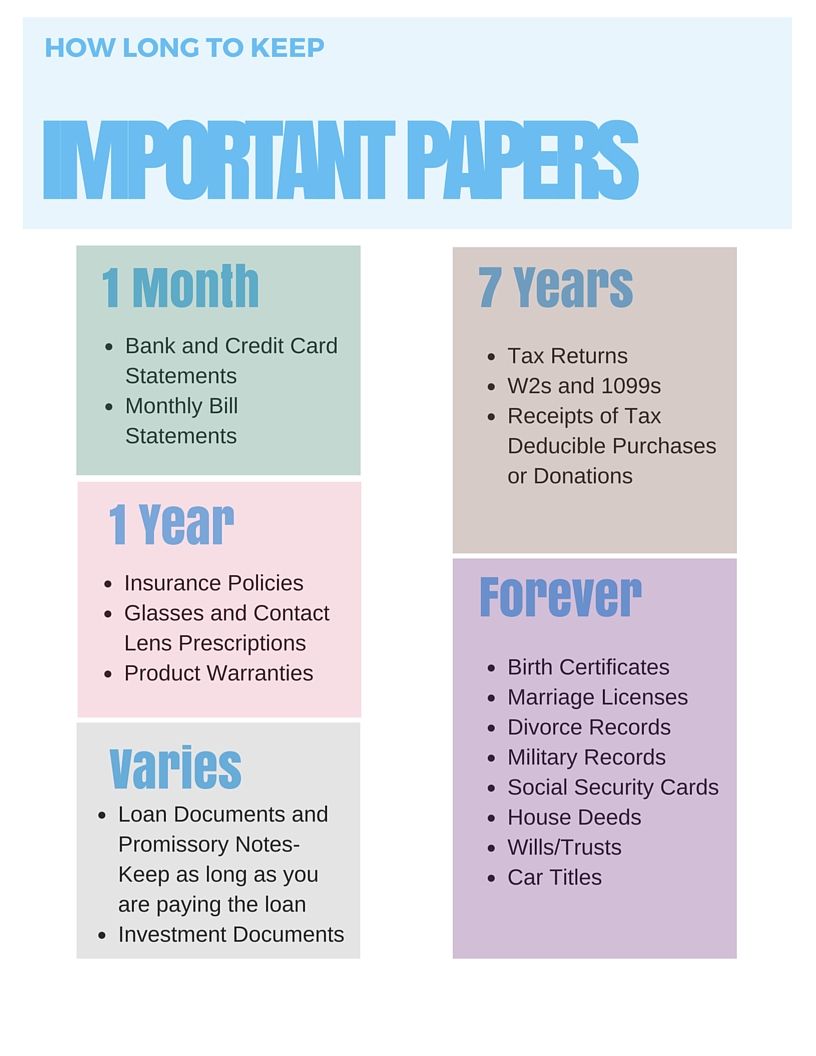How Long Should You Keep Important Documents?

If you've ever found yourself sifting through piles of old bank statements, utility bills, or other documents, wondering if it's safe to finally shred them, you're not alone. Understanding how long to keep important documents is crucial for managing your financial health, ensuring compliance with tax laws, and safeguarding against potential legal issues. In this post, we'll explore the recommended retention periods for various types of documents, helping you create an efficient system for document management at home or in your office.
Why Document Retention Matters

Document retention isn’t just about clutter control; it serves several key purposes:
- Tax Compliance: The IRS and other tax authorities can audit you years after you’ve filed your tax returns, so keeping records is essential.
- Legal Protection: Retained documents can serve as evidence in legal disputes or during negotiations.
- Financial Tracking: Old records can help track your financial history, aiding in planning for your future.
General Guidelines for Document Retention

Here are general guidelines for retaining documents:
- Permanent Documents: These are documents you should keep indefinitely or for a very long time.
- Short-Term Documents: These can be disposed of after a shorter period once their purpose has been served.
Permanent Documents

| Document Type | Description |
|---|---|
| Birth Certificates | Certificates of birth for you, your spouse, and your children |
| Marriage Licenses | Marriage certificates |
| Divorce Decrees | Court decrees for divorce or annulment |
| Adoption Papers | Adoption documents for children |
| Property Deeds | Records of real estate ownership |
| Stock and Bond Certificates | Physical proof of ownership in investments |
| Receipts for Major Purchases | Warranties, manuals, and purchase agreements for major items like appliances, electronics, or cars |
| Passports and Immigration Papers | Travel and immigration documentation |
| Social Security Card | Keep the original safe, but copies can be useful |
| Military Discharge Papers | DD-214 or other separation documents |

📌 Note: Keep digital copies of these documents for convenience and backup.
Short-Term Documents

Here are the retention periods for some common short-term documents:
- Tax Returns: Keep for 7 years. The IRS has up to six years to audit returns for underreported income, and additional time if fraud is suspected.
- Bank Statements: Retain for 1 year, unless they support a tax filing or legal dispute.
- Credit Card Statements: Keep for 60 days to 1 year. Check for fraud or billing errors, and retain those related to tax deductions or disputes.
- Pay Stubs: Retain until you receive your W-2. Keep for 1 year after, for reconciliation and verification.
- Utility Bills: Keep for 1 year, or until the next bill arrives. You may need them for tax purposes if you’re a homeowner.
- Insurance Policies: Keep current policies. Once replaced or canceled, keep for 5 years.
- Medical Bills: Retain 5 years, as they are needed for tax deductions or insurance claim disputes.
Business Document Retention

Business owners face different retention needs:
- Business Tax Returns: Keep for 7 years.
- Income Records: Retain permanently for financial reporting and audits.
- Legal Documents: Partnership agreements, shareholder agreements, etc., should be retained indefinitely.
- Purchase Agreements: Keep 6 years after the sale of the business or property.
- Payroll Records: Retain 3 years for the IRS and 6 years for state taxes, but longer if they involve legal matters.
💼 Note: Each state might have different laws regarding the retention of employment records, so always check your local regulations.
Organizing Your Document Retention

To manage your documents effectively:
- Set up a system that categorizes documents by type.
- Use boxes, file cabinets, or secure digital storage for physical or electronic files.
- Label and date each document for easy reference and disposal.
- Utilize shredding services for sensitive documents once retention periods have expired.
Consider a system like this:
| Category | Description | Storage |
|---|---|---|
| Permanent | Birth certificates, marriage licenses, deeds | Fireproof safe or bank safe deposit box |
| Short-Term | Bank statements, utility bills | File cabinets or digital files |
| To Shred | Expired documents, old bills | Shredding bin |
Changing Technology and Document Retention

With advancements in technology, consider:
- Scanning documents to retain them in digital format for easy access.
- Using secure cloud storage for backup and easier document management.
- Implementing data encryption and secure passwords for sensitive electronic documents.
⚠️ Note: Although digital storage can save space, printed documents often remain the legal standard in some circumstances. Always ensure you have physical copies of critical documents.
The retention of important documents plays a pivotal role in maintaining your financial, legal, and personal life in order. By adhering to recommended retention periods, you can streamline your document management process, avoid legal headaches, and prepare for audits or disputes. Remember, while these guidelines provide a good starting point, individual circumstances might require different practices. Always consult with a legal or financial professional if you're unsure about specific documents or situations.
What documents should I keep permanently?

+
Keep documents like birth certificates, marriage licenses, divorce decrees, adoption papers, property deeds, stock certificates, major purchase receipts, passports, and military discharge papers indefinitely.
Can I keep my tax returns digitally?

+
Yes, digital copies of your tax returns are acceptable for retention, but make sure they are stored securely with backups. Also, consider having physical copies for critical years or legal proceedings.
How long should I keep utility bills?

+
Retain utility bills for one year, or until the next bill arrives, unless they’re needed for tax deductions or to support home office expenses.
What do I do with sensitive documents once their retention period has ended?

+
Shred sensitive documents like bank statements or credit card statements to protect against identity theft.
Should I store documents at home or in a bank?

+
Permanent or highly sensitive documents should be kept in a fireproof safe or bank safe deposit box. Short-term documents can be stored at home in secure, easily accessible locations.



